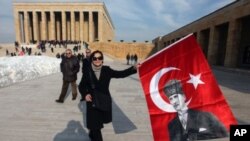In the wake of the Arab Spring, some see Turkey's secular democratic government as a possible model for emerging governments. A former U.S. military officer turned author is touting the course set by Turkey's national hero Kemal Ataturk in the 1920s, even as Turkey's ruling Islam-oriented party challenges some his legacy.
There is probably no bigger fan in the United States of Kemal Ataturk than Austin Bay, a former colonel in the U.S. Army, who wrote a recent biography of the great Turkish leader. Book titled Ataturk, Lessons in Leadership from the Greatest General of the Ottoman Empire.
“There is no doubt that Turkey is attractive to a number of Muslim countries," he said. "It is socially vibrant, it is culturally alive and [there is] the economic growth that Turkey has experienced.”
Bay says Turkey owes much of its success to a secular democratic government that Ataturk promoted when he came to power after the country's defeat in World War I.
“Secular democracy is Turkey's most important, strongest foreign policy asset and I also think it is its greatest domestic strength,” he said.
Turkish Prime Minister Recep Tayyip Erdogan, who is from the Muslim-inspired Justice and Development Party, is sometimes seen as undermining some of Ataturk's secularist ideals at home.
But Bay says Erdogan uses Turkey's secular democracy as a model when he visits Arab Spring countries.
“When he is visiting Egypt, Tunisia and Libya in September, he says it is very important that you achieve a secular democracy and he goes right out and says, 'I am not a secular man,' and he is not, 'but I am prime minister of a secular democracy,” said Bay.
But Turkey's model may not be easily exported, says Reva Bhalla, director of Strategic Intelligence for Stratfor, a geopolitical analysis company.
“Turkey wants to present itself as the model in the Islamic world, one that can act as the liaison between The West and many of these countries that are experiencing pretty big transitions, but there is a big gap between theory and practice,” she said.
Bhalla says that while opposition groups that helped overthrow repressive regimes do seek international support, they are are also wary of outside domination.
“Many of these opposition groups do not like the idea of being dictated by a bigger power like Turkey and are more interested in their national interests,” added Bhalla.
But there are other ways these nations can follow Turkey's example and Austin Bay says Ataturk's emphasis on achieving prosperity through education is one of them.
“He gives a speech in 1923 about the necessity of prosperity and he says 'this is something we are going to bring to Turkey, we are going to create it ourselves,'”
Bay says much of the force behind Turkey's current above-seven-percent growth rate can be attributed to a large well-educated youthful population.
Author Touts Turkish Hero's Model for Arab Spring Nations
- By Greg Flakus











